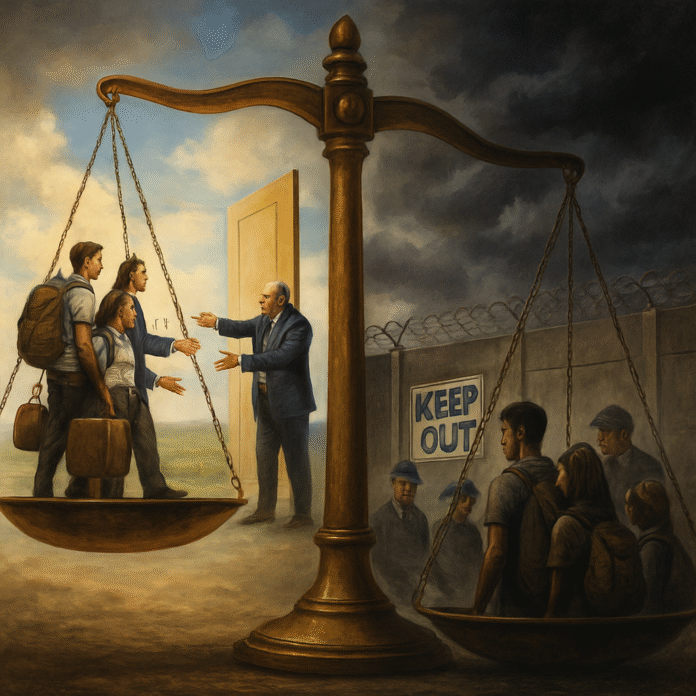The Stark Contrast Between Trump’s Approach to White South African Farmers and Immigrants of Color
The recent arrival of white South African farmers as refugees in the United States highlights a troubling inconsistency in President Trump’s approach to humanitarian concerns. While extending a welcoming hand to one group, his administration has simultaneously implemented harsh policies against others seeking similar protection. This disparity raises important questions about the role of race in American immigration policy.
When speaking about white South African farmers in 2018, Trump expressed deep concern: “They happen to be white, but whether they’re white or black makes no difference to me, but white farmers are being brutally killed and their land is being confiscated in South Africa, and the newspapers and the media, television media doesn’t even talk about it.”
This statement deserves careful examination, especially when compared with Trump’s characterization of asylum seekers from Latin America, Haiti, and other regions with predominantly non-white populations.
The South African Situation: Examining the Facts
In February 2025, Trump signed an executive order establishing refugee status for Afrikaners, the white ethnic minority in South Africa, citing concerns about land expropriation and alleged violence against white farmers. The first group of 59 white South Africans arrived in the United States on May 12, 2025, under this program.
Trump claimed these farmers were victims of “genocide,” stating: “Farmers are being killed. They happen to be white. Whether they are white or Black makes no difference to me. White farmers are being brutally killed and the land is being confiscated in South Africa” The New York Times.
However, fact-checking by multiple sources reveals a more nuanced reality. Police data doesn’t support the narrative of widespread killings of white farmers, showing that farm murders are relatively rare and that victims are mostly Black The New York Times. South African officials have described Trump’s moves as “politically motivated” and designed to “question South Africa’s constitutional democracy.”
The South African government’s Expropriation Act does allow for land acquisition without compensation in certain circumstances, but this is part of a broader effort to address the legacy of apartheid, where Black South Africans were denied the right to own prime agricultural land. Despite making up only 7% of the population, white South Africans still own farmland covering about half the country.
A Different Tone for Different Asylum Seekers
In stark contrast to his concern for white South African farmers, Trump has consistently characterized asylum seekers from Latin America, Haiti, and other regions in dehumanizing terms. His administration has:
-
Suspended the entry of all undocumented migrants to the US, instructing border patrol agents to turn people away without granting asylum hearings BBC
-
Halted the US refugee resettlement program for all groups except white Afrikaners Human Rights Watch
-
Ended a major Biden-era program that allowed up to 30,000 migrants per month from Cuba, Haiti, Nicaragua, and Venezuela to fly into the US on humanitarian grounds BBC
-
Reinstated the “Remain in Mexico” policy, forcing non-Mexican asylum seekers to wait in Mexico until their asylum claims are resolved BBC
Trump has repeatedly characterized immigrants of color in deeply troubling ways, calling them “criminals,” “killers,” “gang members,” and claiming they’re “poisoning our country” The Marshall Project. He has falsely claimed that countries are emptying their prisons and mental institutions to send people to the United States Snopes.
The Reality of Immigration and Crime
Research consistently shows that immigrants, including undocumented ones, commit fewer crimes than native-born Americans. A 2017 study found that across 200 metropolitan areas, immigrants are “less likely to offend than native born Americans” The Marshall Project.
Similarly, a 2023 Cato Institute analysis found that the annual odds of an American being murdered in a terrorist attack by a refugee is one in 3.3 billion, and the chance of being killed in a terrorist attack committed by an undocumented immigrant is “zero” The Marshall Project.
The Human Cost of Policy Inconsistency
The stark contrast between Trump’s approach to white South African farmers and asylum seekers of color reveals a troubling double standard. While one group receives expedited processing and a warm welcome, others face harsh policies that separate families, deny legal rights, and put lives at risk.
This inconsistency not only undermines America’s moral standing but also raises serious questions about whether our immigration policies are being shaped by racial bias rather than genuine humanitarian concerns.
Moving Forward with Compassion and Consistency
A truly fair immigration system would evaluate all asylum claims based on their merits, regardless of the applicants’ race, religion, or country of origin. It would recognize that people fleeing violence, persecution, and extreme hardship deserve consideration and dignity, whether they come from South Africa, Haiti, Guatemala, or Syria.
As Americans, we must ask ourselves: Do we want an immigration system that extends compassion selectively, or one that lives up to our highest ideals of equality and justice for all?
The answer to that question will define not just our immigration policy, but who we are as a nation.



